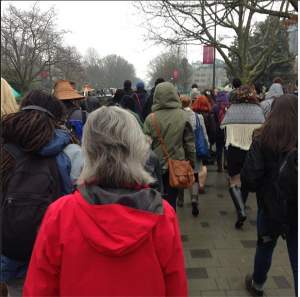Welcome
by Daniel Swenson
Hi and welcome to my course blog for English 470: Our Home and Native Land. The course intends to sort through histories of past and present colonization on indigenous peoples across Canada, placing storytelling as an embodied act of history-making at the forefront. The course is augmented by the Internet, using blogs, twitter, vlogs, skype, and other collaborative technologies to foster online community and education.
I, as a settler on this land, living, nourishing, and educating myself full-time on the traditional and now-ceded territory of the Tsawwassen First Nation, and part-time on the unceded and ancestral territory of the Musqueam Nation, have a strong commitment to understanding what settler privilege looks like. Further, I’m greatly interested in the ways in which ‘reconciliation’ operates from Canada, keeping in conversations of the Truth and Reconciliation Commission that began this September, and the grass-roots organizing delivered by protests and activisms such as Idle No More.
What this means for me in this course is a constant engagement with indigenous academics, particularly those at UBC such as Dr. Glen Coulthard, a Yellowknives Dene scholar, or Dr. Dory Nason, an Anishinaabe and Chicana teacher in the English department here. Centering the voices of indigenous peoples while doing research about histories of ongoging colonization is a top-priority for me, as well as investigating artists, story-tellers, healers, activists, and other community members of indigenous nations such as Elle-Máijá Tailfeathers, a Blackfoot and Sámi (pdf link) filmmaker.
I am very excited to be critically engaging with these texts and online spaces in order to help my commitment to a decolonizing sensibility, particularly one in the academic space of UBC by investigating my own reasons for being here as a white settler, and reading the stories of the bodies and peoples who came before me, and continue to exist and resist across these lands.

A photo I took during one of the UBC First Nation Student Associations marches for the Idle No More movement.
Works Cited
Coulthard, Glen. “Glen Coulthard : Idle? Know More! Idle No More.” YouTube. Idle Know More, 25 Jan. 2013. Web. 07 Jan. 2014.
García, Alma M. Chicana Feminist Thought: The Basic Historical Writings. New York: Routledge, 1997. Web.
Idle No More. “The Movement.” Idle No More, n.d. Web. 07 Jan. 2014.Musqueam Indian Band.
Kim, Jennifer. “Read All Over – Elle-Máijá Tailfeathers.” Vancouver Is Awesome. Vancouver Is Awesome, 13 June 2012. Web. 07 Jan. 2014.
Little River Band of Ottawa Indians. “Anishinaabemdaa.” Anishinaabe Culture, Anishinaabe History and Ceremonies. Anishinaabemowin Program, n.d. Web. 07 Jan. 2014.
Long Standing Bear Chief. “The Official Web Site of the Blackfoot Nation.” The Official Web Site of the Blackfoot Nation. The Blackfoot Nation, n.d. Web. 07 Jan. 2014
“Musqueam: A Living Culture.” Musqueam Indian Band, n.d. Web. 07 Jan. 2014.
Nason, Dory. “Dory Nason: Indigenous Feminist, Chicana Badass. Anishinaabekwe.” Twitter, n.d. Web. 07 Jan. 2014.
“Sami Self-Determination: Land, Resources and Traditional Livelihoods Self-Determination and the Media.” Ed. John B. Henriksen. Gáldu Čála-– Journal for the Rights of Indigenous Peoples, 2011. Web. 07 Jan. 2014.
Tailfeathers, Elle-Máijá. “A Red Girl’s Reasoning (Excerpt).” YouTube. YouTube, 26 Mar. 2012. Web. 07 Jan. 2014.
Truth and Reconciliation Commission of Canada. “Welcome.” Truth and Reconciliation Commission of Canada, n.d. Web. 07 Jan. 2014.
Tsawwassen First Nation. “Tsawwassen First Nation: Land Facing The Sea.” Tsawwassen First Nation, n.d. Web. 07 Jan. 2014.
Yellowknives Dene First Nation. “Yellowknives Dene First Nation.” Yellowknives Dene First Nation, 2009. Web. 07 Jan. 2014.
I really looking forward to following your blog and hearing your take on the readings. You have a really good bio.
Hi Daniel! Look forward to reading more.
I particularly appreciated your acknowledgement of UBC being located on ancestral land as this is so often mentioned in passing out of routine rather than a true nod of respect, as you have done.
You reminded me of the heading of a syllabus a once received with the top reading:
Buchanan A202
University of British Columbia
Musqueam Territory
like a real address.
Hi Daniel,
Thanks for the links to indigenous voices from UBC and beyond. Listening to Dr. Coulthard speak about land claim struggles was very informative. There is also a research group and program of studies related to indigenous voices in law at UBC, the Indigenous Legal Studies Program. Another place to keep informed about current indigenous affairs.
“Indigenous Legal Studies.” UBC Law. University of British Columbia. Web. 13 Jan. 2014.
Woah, phenomenal–thanks so much I know and am involved with the Feminist Legal Studies Program at UBC, but was not aware of the Indigenous Legal Studies Program–what a phenomenal project and work that program is doing. Thanks for pointing me in that direction, I really appreciate it!
Hi Daniel – just got your email and I am surprised my comment is not here. But, I write comments on a word doc and cut and paste – so, I missed you. Yours was one of the first blogs I read and I was certainly pleased to hear/read you speak of your commitment to “a decolonizing sensibility, particularly one in the academic space of UBC by investigating my own reasons for being here as a white settler, and reading the stories of the bodies and peoples who came before me, and continue to exist and resist across these lands.” We stand on common ground – you and I, or as they say in the Caribbean: I and I. Here is the comment I wrote last week, but strangely – did not post. Thanks.
Daniel, As I open your links I am reminded of how much the internet has enabled the First Nations peoples and so many others to have a voice, a platform from which to tell their own histories and stories. It is interesting that academics have traditionally remained so silent on this part of our story, and now that the publisher is removed from the equation there is a virtual explosion of voices representing themselves – without a mediator. Thank you.